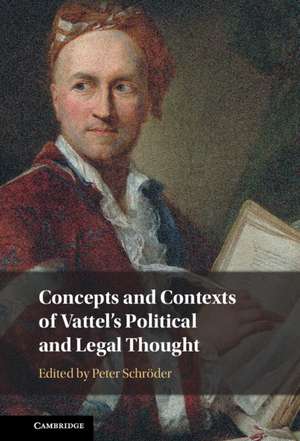Concepts and Contexts of Vattel's Political and Legal Thought
Editat de Peter Schröderen Limba Engleză Hardback – 23 iun 2021
Preț: 782.50 lei
Preț vechi: 909.89 lei
-14% Nou
Puncte Express: 1174
Preț estimativ în valută:
149.74€ • 160.11$ • 124.84£
149.74€ • 160.11$ • 124.84£
Carte tipărită la comandă
Livrare economică 17 aprilie-01 mai
Preluare comenzi: 021 569.72.76
Specificații
ISBN-13: 9781108489447
ISBN-10: 1108489443
Pagini: 400
Dimensiuni: 158 x 236 x 24 mm
Greutate: 0.63 kg
Editura: Cambridge University Press
Colecția Cambridge University Press
Locul publicării:Cambridge, United Kingdom
ISBN-10: 1108489443
Pagini: 400
Dimensiuni: 158 x 236 x 24 mm
Greutate: 0.63 kg
Editura: Cambridge University Press
Colecția Cambridge University Press
Locul publicării:Cambridge, United Kingdom
Cuprins
Concepts and contexts of Vattel's political and legal thought – an introduction Peter Schröder; Part I. Historical and Intellectual Contexts: 1. In search of a nation: Vattel, Neuchâtel and the Swiss confederacy Nadir Weber; 2. Sovereignty contested: Vattel's use of Leibniz, Hobbes and Pufendorf Ben Holland; 3. The development of the law of nations: Wolff and Vattel Ere Nokkala; 4. Vattel and the Abbe de Choisy: French historiography, piety and law of nations Francesca Iurlaro; 5. Vattel and the seven years' war Koen Stapelbroek; Part II. Concepts: 6. Vattel, the balance of power, and the moral justification of war Camilla Boisen; 7. Regular war, irregulars, and savages Pablo Kalmanovitz; 8. Constitutionalism Antonio Trampus; 9. Vattel's theory of the social contract Gabriella Silvestrini; Part III. Receptions: 10. Vattel's reception in British America, 1761–1775 Mark Somos; 11. Tradition and revolution: eighteenth century German and French contexts and Vattel's law of nations Nathaniel Boyd; 12. Vattel's law of nations in late eighteenth- and early nineteenth-century Greece and Italy Elisabetta Fiocchi Malaspina; 13. Reception of Vattel in 18th and early 19th century England and Scotland Marco Barducci; 14. Receptions of Vattel in 19th- and 20th-century international law Theodore Christov; 15. Vattel's reception in international relations Richard Devetak.
Recenzii
'This volume sheds exciting new light on one of the most important figures in the history of international law, diplomacy, and politics, Emer de Vattel. Rather than treating Vattel as a philosopher, the contributors focus instead on how he reworked natural law thought to cope with the exigencies of European war and peace-making. The result is an illuminating and multifaceted picture of Vattel in the contexts of his many receptions and uses.' Ian Hunter, Emeritus Professor, Institute for Advanced Studies in the Humanities, University of Queensland
Concepts and Contexts of Vattel's Political and Legal Thought brings together a collection of highly original and penetrating studies of one of the founders of international law whose Law of Nations remained a classic up until the twentieth-century. This is an excellent place to start thinking about why sovereign states should help one another and under which conditions they could do so. Béla Kapossy, Professor of Modern History, Université de Lausanne
Concepts and Contexts of Vattel's Political and Legal Thought brings together a collection of highly original and penetrating studies of one of the founders of international law whose Law of Nations remained a classic up until the twentieth-century. This is an excellent place to start thinking about why sovereign states should help one another and under which conditions they could do so. Béla Kapossy, Professor of Modern History, Université de Lausanne
Descriere
Explores how Vattel used the natural law tradition to frame a pragmatic and treaty-oriented model of the law of nations.
